Happy New Year (Ros' Blog)
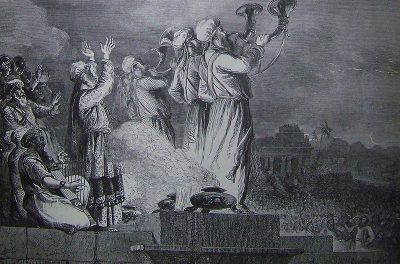
The Israelites of the Old Testament certainly knew how to celebrate festivals in style. From the festivals of Passover and First Fruits in the month of Nisan, the start of the liturgical year, through the feasts of Pentecost and Tabernacles (think family camping adventure) and all the rest of the seven appointed feasts, there were traditions of celebration and joy that accompanied all of them except that the feast of Atonement tended to be a more solemn affair.
The civil New Year fell at the start of the seventh month, Tishri and was marked by the Feast of Trumpets. (This is not as strange as it sounds; our civil year starts in January, but our financial year starts in April and our academic year in September.) The Feast of Trumpets was a time to down-tools and rest from work, to make offerings to the Lord of bulls, rams, lambs, grain and oil, and to gather together in a sacred assembly to sound trumpets, before going home as families to feast together.
I don’t know how you celebrated the New Year this time around. I’m guessing there may not have been too many trumpets involved! At my church we met to share communion quietly together in the early part of the evening, while those with the stamina went on and partied into the small hours. A New Year is always a good time to take stock, to draw a line under the past and to take a deep breath as we face the coming year.
It may be that in 2016 you acquired a disability for the first time. Perhaps your condition worsened or you had health battles. Maybe you lost a loved one. Perhaps you are clawing your way back to health and experienced some significant milestones along the way in 2016. Whatever the last year held for you, whether easy or painful, it has come to an end. 2017 stretches out before you like a blank canvas. The only certainty is the presence of God with you in it all.
For Through the Roof, 2017 is a special year, as it marks our 20th anniversary. We can look back in thankfulness to all that God has achieved during our twenty years of existence. And we will be holding a thanksgiving service at St George’s church, Ashtead on September 9th – save the date! We will also be inviting you to hold anniversary celebrations throughout the year, and providing you with a kit containing all you need to do that – look out for more information on that over the next few weeks. But we don’t want our expectations for the future to be limited by what we have seen God do in the past. Who knows where He may want to take us next?
I love the words of God in Isaiah 43 to His people as they contemplated the future: “Forget the former things; do not dwell on the past. See, I am doing a new thing! Now it springs up; do you not perceive it? I am making a way in the wilderness and streams in the wasteland.” (Isaiah 43.18-19) So, in whatever condition you ended the last year, close the door on it and turn towards the coming year, confident that whatever it holds, God will use it in your life to make a way in the wilderness and streams in the wasteland. And if you can herald it by blowing a few trumpets, so much the better!
Image is Blowing the Trumpet at the Feast of the New Moon, illustration from the 1890 Holman Bible
Swords into Ploughshares (Ros' Blog)
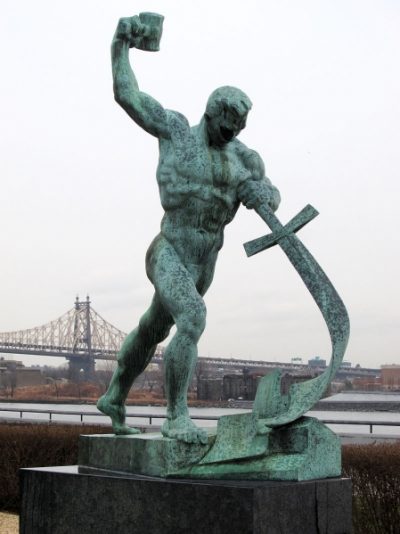
As I write, it looks as though the massacre in, and entire destruction of, Aleppo will eclipse even the genocide at Srebrenica in 1995. Hundreds of schoolgirls kidnapped by Boko Haram in Nigeria remain unaccounted for. Tens of thousands of innocent civilians in homes, hospitals and schools in Yemen are being slaughtered by government and Saudi forces, using weaponry supplied by our own country. Closer to home, while refugees languish in unregulated huddles along its northern coast, as well as in temporary detention centres around the country, the French Council of State has banned a film in which parents of Down’s Syndrome children explain the joy of having such a child in their family. The reason? The film might “disturb the conscience” of women who decide to abort Down’s Syndrome foetuses. Meantime 100% of Down’s Syndrome babies are aborted in Iceland, with Sweden not far behind. Here in the UK, reported hate crimes against disabled people have risen by 213% in the past five years, with the Crown Prosecution Service stating that it believes the unreported figure is far higher. On our streets, homelessness has also doubled during that period, with the majority of homeless people having either disabilities or mental health issues.
What price peace on earth and goodwill to all men? In the face of all that is going on, so much of which is completely outside our control, it seems natural, even reasonable, to despair. But as we celebrate the coming of a migrant who was told, “No room”, and who fled as a refugee to a foreign country, let us not forget that God has always been at work in the darkest places, making even the “wrath of man to praise Him” (Psalm 76.10). And though the scale of disasters caused by humans may have increased, and the reporting of them is now able to reach a worldwide audience, the spirit of enmity and hostility that fuels them is nothing new. As long ago as 1849 Edward Sears penned these words:
“Yet with the woes of sin and strife
The world has suffered long;
Beneath the angel-strain have rolled
Two thousand years of wrong;
And man, at war with man, hears not
The love song which they bring:
O hush your noise, ye men of strife,
And hear the angels sing.”
Despair becomes possible in the face of all this when we have a temporal perspective on the world. As people in Aleppo tweet their goodbyes, and we know that for many of them it really will be the last goodbye, we must remember that God’s perspective is eternal. As St Paul said, “If only for this life we have hope in Christ, we are of all people most to be pitied.” But our hope goes beyond this life. God is still sovereign, still in control, still committed to uniting everything in peace and justice under the Lordship of Jesus. This is our ultimate hope: all wrongs really will be righted one day, and the reigning force in all of creation will be the love and grace of God our Creator, unopposed and victorious. That’s why Edward Sears could end his carol with lines reminding us of a time that is coming:
“When peace shall over all the earth
Its ancient splendours fling,
And the whole world give back the song
Which now the angels sing.”
Some things are so important that God says them twice to make sure we get it. These words appear both in Isaiah 2.4 and Micah 4.3: “He will judge between the nations and will settle disputes for many peoples. They will beat their swords into ploughshares and their spears into pruning hooks. Nation will not take up sword against nation, nor will they train for war any more.”
Here at Through the Roof We wish you a Christmas filled with the peace of God that passes understanding and a New Year of resting in the security of His love.
Volunteers needed!
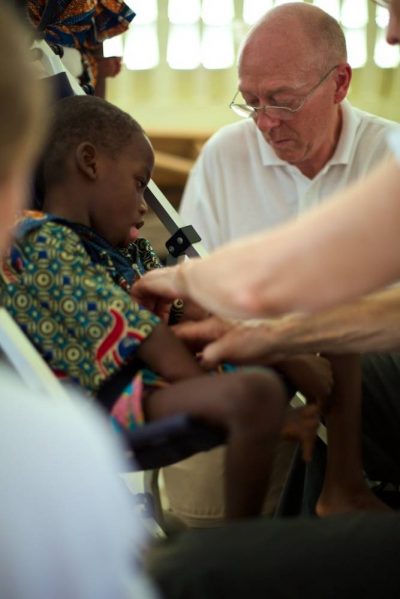
Volunteer Therapists
If you are Physiotherapist or an Occupational therapist, and would like to volunteer 10 days of your time, using your skills to provide life transforming opportunities to disabled people in developing countries, we would love to hear from you. We are a Christian charity that facilitates opportunities for disabled people in remote places to be fitted with refurbished wheelchairs.
Volunteer pastors/ministers/church leaders
We are looking for pastors, and people in Church leadership to take a week to ten days of their time to teach at Leader’s Events in developing countries. We encourage and equip local pastors in developing countries to include disabled people into the life of the Church. You could be a part of this developing mission.
Contact Shaun at Through the Roof to find out more
Here Comes The Bride (Ros' Blog)
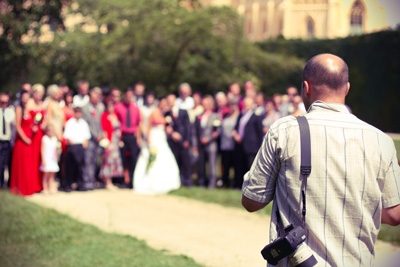
I was looking round the congregation at my church yesterday and thinking what a mixed bunch we are. The youngest present was about two years old, the oldest in his mid-eighties. There were singles, couples and families with children. There were people with physically able bodies and people with physical impairments. There were people who could walk unimpeded and those who relied on sticks or, in my daughter’s case, a wheelchair. There was a highly qualified lawyer and there were people with learning disabilities. There were people with very comfortable incomes and people who struggle hard to make ends meet. Interestingly, there wasn’t much ethnic diversity – but as a church we meet in two separate “hubs”, coming together for a joint meeting once a month, and I know that when we hold our joint meeting there are a variety of different nationalities, languages and ethnicities represented. All in all, we are a very diverse mix.
It’s great, too, that we all have a part to play, and all our contributions are equally valued. Three people had planned yesterday’s service, and each had a part to play, whether leading or speaking. But when something that was said struck a chord with the oldest member of the congregation, he was given the microphone so we could all benefit from his wisdom. When the two year old was running exuberantly around, not being the slightest bit naughty but being very noisy and stressing out his single mum who, after all, takes care of him all day every day without a break, one of the men came and scooped him up in his arms, gave him the attention he needed and played with him – as much an act of worship, to my mind, as anything else that went on that morning. And when my daughter leaned over to me and said, in her customary stage whisper, “Mummy sing ‘He is high and lifted up’,” the worship leader immediately picked up his guitar with the words, “Let’s respond to what Ellen just said,” and began to lead us all in her chosen song.
I grew up in a Christian tradition which laid great emphasis on the individual’s relationship with God and the need to be personally born again. Of course this is an important truth. Our starting place in our spiritual journey is in coming into a personal relationship with God through Jesus, and receiving the indwelling of the Holy Spirit. But it struck me, as I looked around that diverse bunch of people yesterday, that Christ lived, died and is coming again for one bride. He is not a polygamist with many spouses, but the husband of His one bride, the church. And so we are much more than a collection of individuals. We are, in some very real way, members of one another. We miss perhaps the crux of what God has planned for this world if we don’t recognise the very corporate nature of our faith, the fact that I am connected to you, and we are in some very real sense, one entity, just as we are one with Jesus through our union with Him. When Paul writes, “Rejoice with those who rejoice, and weep with those who weep, be of the same mind toward one another; do not be haughty in mind, but associate with the lowly” he is perhaps not so much issuing an instruction as writing a description of what it is to be the church, the one bride of the everlasting husband who is Christ.
When our brothers and sisters with physical, sensory or learning disabilities are sidelined and overlooked, when our faithful brothers and sisters in other parts of the world are persecuted, when internet pornography beguiles some of our number into immorality, when others among us live in unalleviated poverty, whatever circumstances wound the Bride of Christ, we don’t simply have a duty to reach out and help; we ourselves are also wounded because we are part of each other and all are affected by what affects each of us. Jesus will return one day for a bride, one entity, who is without spot or blemish. All that we experience here and now is intended to enhance our unity and to draw us closer to our Bridegroom, Jesus, so that when He returns the bride who awaits Him will be a reflection of His own perfection, and not simply a collection of individuals who each have their own relationship with Him, although those individual experiences of intimacy do all, of course, contribute to the love of the bride for her Bridegroom.
If you share Through the Roof’s heart to see disabled Christians taking their place within the bride of Christ, their experiences felt and shared by the rest of the body, why not consider becoming a Roofbreaker and helping your church to ensure that all its members, no matter what their abilities or limitations, play the full part for which God created them? For more details about how you can share in this ministry, follow this link.
Our Winter 2016 Newsletter
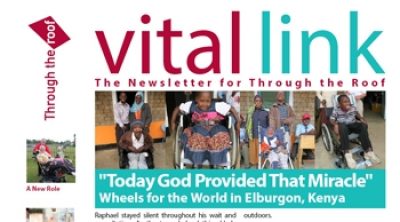
The Winter 2016 Vital Link Newsletter is now available for download - this issue contains stories from the Wheels for the World distribution in Eldoret, stories from volunteer leaders, details of TTR's 20th birthday plans, next year's holidays and mission trips and much more.
- Follow this link to download the Winter 2016 Vital Link (with Donor Form, and letter from Tim Wood, CEO) - right-click and select 'save' to save the file for later
 Please get in touch (on 01372 749955 or by following this link to email us) if you have any problems downloading this, or if you’d like to receive future newsletters by post or email.
Please get in touch (on 01372 749955 or by following this link to email us) if you have any problems downloading this, or if you’d like to receive future newsletters by post or email.
Summary of briefing on Lord Shinkwin’s Disability (Abortion Equality) Bill

Here's a summary of our briefing on Lord Shinkwin's Disability (abortion equality) bill and TTR's thoughts on the situation. The full briefing is available to download by following this link
Outline of the Bill
Baron Shinkwin, a disabled member of the House of Lords, has introduced a Private Member’s Bill called the Abortion (Disability Equality) Bill. The Bill proposes that the time limit for abortion of foetuses where there is a “substantial risk” of “serious handicap” should be brought into line with the time limit for non-disabled foetuses.
The law as it stands
Currently the abortion law in Great Britain excluding Northern Ireland allows for abortion at any stage of the pregnancy up to full term if the mother’s life or health is seriously endangered. It allows for abortion up to 24 weeks if there would be a risk to the physical or mental health of the mother or her existing children from having another baby. And it allows for abortion up to full term if there is a “substantial risk of serious handicap” to the foetus.
The effects of the law
In 2015 in England and Wales 3,213 late term abortions were carried out where the baby was deemed to be at substantial risk of “serious handicap”. This represents 2% of all abortions, although there is significant under-reporting of these abortions, and the true figure is likely to be appreciably higher. In Scotland in the same year there were 186 late term abortions for “serious handicap”.
The meaning of “seriously handicapped”
The law gives no definition of this term, and it is left to be determined by clinical judgement and accepted practice. People with personal experience of disability have tried to challenge abortions performed for relatively minor defects such as cleft lip and palate, but the courts have not upheld their views.
From this it would seem that the disability rights movement’s mantra of “nothing about us without us” is suspended in the area of deciding what constitutes a “serious handicap”. It is non-disabled members of the legal and law enforcement professions who decide what constitutes a “handicap” so serious that the unborn child would be better off dead, and the opinion of someone with actual experience of living with a similar or more severe disability counts for nothing.
In 1996 before the Abortion Act was passed, suggestions that it would lead to terminations on the grounds of relatively minor conditions such as cleft palate were described by Sir David (now Lord) Steel, the Bill’s sponsor, as “a gross calumny on the medical profession” and by other participants in the debate as “pure scaremongering”. These remarks seem naïve, if not disingenuous, in the light of the fact that in 2015 11 late term abortions were performed for cleft lip and palate.
The case for Lord Shinkwin’s proposed amendment
Over the past 5 years there has been a 56% increase in terminations after 24 weeks on the grounds of “serious handicap”. Taken over the past 10 years the figure is a 68% increase, and over the past 20 years a 271% increase.
The mainstay of Lord Shinkwin’s argument is that the law no longer allows discrimination against persons on the grounds of their disability. This is recognised by both the UK Equality Act and the European human rights legislation. To allow abortion up to full term of foetuses purely on the grounds of disability establishes in law a pernicious threat to the lives of disabled people.
Objections to Lord Shinkwin’s proposal
Most of the objections have come from people who believe that a woman has an absolute right over her own reproductive choices and that no one has the right to interfere with that.
Others contest that equality and disability legislation cover only the rights of living persons, and that under British law a foetus has no legal status independent of its mother. This is incorrect. A foetus does indeed have legal status and legal protection in respect of certain characteristics. An abortion cannot be performed on the grounds that the mother would be mentally distressed by having a baby of a particular gender, ethnicity, skin colour or sexual orientation. Disability is the only characteristic that is a particular target for discrimination.
Progress of Lord Shinkwin’s Bill
The Private Member’s Bill was first debated in the House of Lords on 25th May 2016 and was granted a second reading. This took place on 21st October 2016. The Bill passed its second reading, and will now proceed to the Committee stage (although no date has yet been set for this) followed by the Report stage, before receiving its third reading in the House of Lords. If it passes its third reading, it will then proceed to the House of Commons.
Through the Roof’s view
The Bible is clear that all of us are made in the image of God, that all of us are loved by God, and that God has a special place in His heart for those whom the world despises. God acknowledges Himself as the creator of those with and without disabilities and declares His knowledge of, and support for, the unborn.
The Bible also leaves us in no doubt that disabled people have a major role to play in the purposes of God. People with physical impairments, mental illnesses and life-limiting anxiety disorders all feature as some of the great champions of the Bible.
The most important message we can give to disabled people is that God created you because you are an essential component of the universe as He desired it to be. In what the world perceives as your weakness, He makes known His strength. In what the world perceives as your foolishness, He makes known His wisdom. Where the world perceives your disability as shame we, the people of God, bestow honour. As the Church we need what God supplies through you. Without you, God’s house is not full.
Through the Roof fully supports Lord Shinkwin’s Bill. We would welcome a world in which disability is not seen as a ground for abortion at any stage of pregnancy, but we recognise the pragmatism of Lord Shinkwin, in that it would be very difficult to get support in Parliament for a ban on all abortions for disability. We invite you to pray with us for the Bill’s success at all stages of its journey through Parliament, and to encourage your own MP to support it, so that in future there will be no discrimination against the unborn on the basis of disability.
Meet the Bravest of Britain! (Ros' Blog)
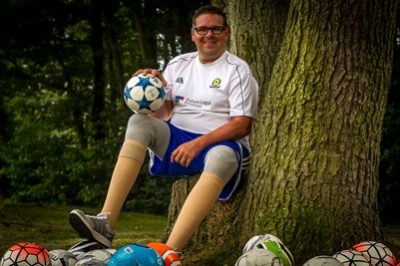
I recently had the privilege of talking to Mark McGowan who has just been awarded both the Community Champion award and the Bravest of Britain award in the Charles Holland Awards for Brave Britons 2016, sponsored by Amplifon. Mark is a minister who lives in Farnborough with his wife Jo and their children Millie, Ella and Caleb.
Hello Mark, and thank you for agreeing to talk to Through the Roof. Can you tell us a bit about your background?
I was born without fibula bones and had my lower legs amputated when I was eighteen months old. My parents got saved partly through that experience, and so I grew up in a Christian home as a result. I also grew up loving football!
When and how did you become a Christian yourself?
Through my disability I always had a relationship with God, but in my late teens I really developed that relationship with Him through missing so much schooling. I backslid between the ages of seventeen and nineteen, but through meeting Jo who later became my wife, I started really following Jesus seriously.
What difference did knowing Jesus make to your life?
I knew I had someone to speak to twenty-four/seven. I had an inner peace to cope with my disability, to know who I was and why I was like I was.
What led you into full time Christian ministry?
Three weeks after Jo and I were married, we were approached by our church and invited to help with the youth work. We prayed and felt it was right to say yes. We ran the young people’s work voluntarily for four or five years and then the senior pastor asked us if we would take on the ministry to children and young people as a paid role. Over time the role has developed. We’re no longer working with the church’s children and young people, but ninety-nine percent of what I do is community ministry, reaching out to the children outside of church mainly through football coaching. I’m doing much more outside the four walls of church now, reaching out into the community.
How did you get into Faith and Football?
I’ve always loved football, but I couldn’t play as a child because of my disability, which was difficult. I became aware of a need in quite a deprived area of Farnborough and wanted to do something about it. I was put in touch with Faith and Football in Portsmouth which was started by Linvoy Primus. With the help of Faith and Football I started a league in this part of Farnborough. We now have fifty-eight children registered with us, and through them we’re reaching a total of over forty families. This has opened doors into local schools, and given opportunities for discussions with local people in the community.
What motivates you to serve the community in this way?
I just want to share the love of Jesus to local children and the community. I believe Jesus should be out in the community, not just in church buildings.
You recently achieved the amazing feat of climbing Ben Nevis to raise funds for Faith and Football. What made you decide to do it?
Last year on New Year’s Eve we got together with friends and we just started discussing the coming year – shall we do something challenging? And I Googled the highest mountain in the UK and found it was Ben Nevis, so I decided to climb it. I prepared by doing stamina walks and long walks getting accustomed to steep gradients and getting used to walking with crutches, which I would need on the climb. I did eight months of training. On one training walk one of my prosthetic legs snapped and I had to be carried back to the car. I had blisters and sweat issues around the prostheses, things any amputee faces. The climb was the hardest thing I’ve ever done in my life. From New Year’s Day onwards I had confessed out loud every single day that I was going to climb Ben Nevis on October 3rd. On the day the weather was absolutely perfect. There was no cloud, but it was a very long, very hard climb. It took us seven and a half hours to the summit and six hours back down. Some of the non-disabled people in the team struggled with it. At the summit I was so blessed to get enough phone signal to be able to ring Jo and share the experience with her, which was special. I felt totally overwhelmed but really proud of myself. Coming down the last two hours were in the dark, which was quite scary. I just felt relieved to get back to the minibus.
Tell us about winning the Amplifon Charles Holland Award.
I was nominated by Paul, one of the team who climbed Ben Nevis with me. He nominated me in the Community Champion category, which is awarded to a member of the public who has made a significant or inspirational contribution to their community. I received a call to say I had been shortlisted and inviting me to attend the ceremony. I was quite humbled to hear the other nominees’ stories. It was really unexpected to win the Community Champion award, but I was overwhelmed to also win the overall Bravest of Britain.
Many people reading this blog will be disabled Christians who could use some encouragement. What would be your message to them?
Know who you are in God. God has a perfect plan for you. I love Jeremiah 29.11 – “For I know the plans I have for you says the Lord, plans to prosper you and not to harm you, to give you a future and a hope.” At times I ask the question, “Why God?” but deep down I do know why, because I’m able to share my story with others and I know God has a perfect plan for my life.
If you had the opportunity to be miraculously healed tomorrow, would you take it?
No. Because God has made me who I am.
Thank you so much for sharing your story with Through the Roof.
Wheelsblog: Uganda (28.10.16)
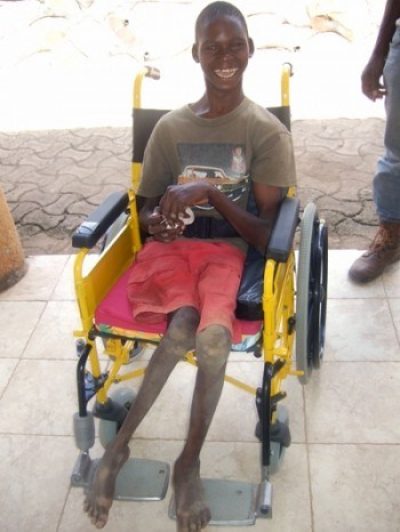
Departure from normal, two of our members went out on a home visit to see one lady of 85 who is blind and unable to join in on community life. With a wheelchair we were able to supply, she wheeled out and all her community greeted her.
Back at base, we also saw a 95 year old gentleman with Parkinson's disease and a devoted family. We were able to give him a reclining wheelchair with headrest which he looked very comfortable in.
Another elderly man came in hoping for a wheelchair, but left instead with crutches. While this may have been a disappointment for some, he shouted at the people in the waiting area as he left 'look, I have four legs, soon I will be running!'.
One silver child's walker had stayed in the store although we had tried it with several children, but today its rightful owner came to claim it. It was a little lad who had never walked before, but with a sturdy pair of boots he was soon making tracks.
The masterpiece of the day was a cardboard sitting box custom-built for an 8 year old girl who had cerebral malaria when she was one year old. Several people were involved in shaping the foam and supporting fragile joints. We were also able to demonstrate comfortable and therapeutic positioning for sleeping and gaining head control.
Another late customer was a 31 year old man with athetoid cerebral palsy. He explained that he had become a burden on his family and so they had abandoned him in the hope that he would die. However, instead he moved away from the village and had employed a carer. He recently married and now lives with his wife. A suitable wheelchair was found, and after talking to the pastor, he also gave his life to Jesus.
We finished our penultimate day with just three chairs and about ten pairs of crutches left.
- Follow this link to read the previous post
- Follow this link to find all of the blog posts from this (and other) Wheels trips
Wheelsblog: Uganda (27.10.16)
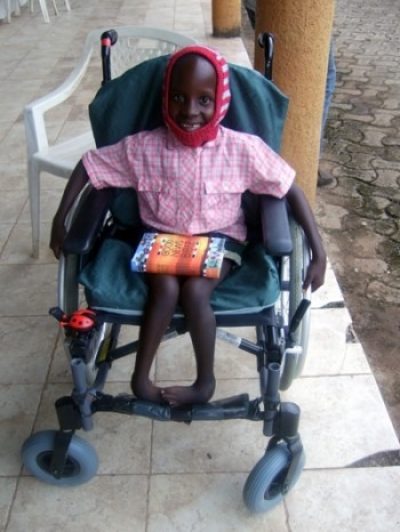
We were greeted with clear blue skies and relentless sun and were very very grateful for the shaded veranda. The tent had been full on our arrival. One group had started out at 2am and arrived at 5am but to some degree we have gotten used to the waiting as it seems to be cultural.
We were conscious from the outset that we had swindling resources to offer people, in terms of wheelchairs particularly and we had to get creative with cardboard boxes and foam for the children who had sitting balance and potential. We also experimented with a tutorial class for parents with children to give them basic pointers on positioning, stretches and activities to encourage head control. The time invested in streamlining the triage and allocation of our clients paid off in that we were more accurately able to match the talents of the therapists with the needs of the clients.
A heavy rain shower freshened the atmosphere and we finished the day in good heart. Necessity being the mother of invention, we found the creative aspects of the day quite satisfying and trust that most people went away happy and with something to improve their lives.
We met some lovely people during the day. Suné worked with a 90 year old man who had come in hope of a wheelchair but walked away happily with a walking frame. He was fascinated that he could also sit down on it and afterwards enjoyed a very animated discussion with the Pastor. Kathy worked with a young girl who we thought we would be able to find a suitable chair for, but ended up prescribing her a child's walker. We had tried it unsuccessfully with various clients earlier in the week and it was great to see it with such a determined final owner!
Our final client was a six year old boy who Anj had to carry away screaming from the waiting tent, with his faithful granddad following close behind. We learnt later that the only white people he had seen before had been running vaccination clinics and so that's what he thought was happening! Tears soon turned to beautiful smiles as Anj and Philip transformed an adult chair into something that fitted him and enabled him to self propel independently.
As our distribution is drawing to a close, we are praying for a tangible presence of God to be understood by all and for His glory to be seen in the practical and personal.
- Follow this link to read the next post
- Follow this link to read the previous post
- Follow this link to find all of the blog posts from this (and other) Wheels trips
Wheelsblog: Uganda (26.10.16)
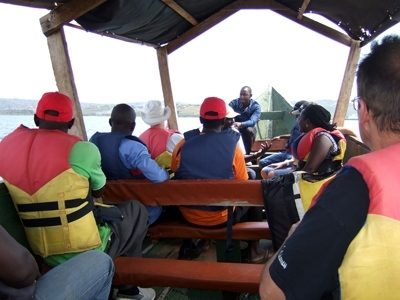
Today was our rest day, although few British people would describe spending six hours on a bus as restful! Indeed Helen, who wasn’t feeling 100% in the morning and had chosen to stay behind, looked far more rested and well than the rest of us when we returned from Jinja! However, seeing God’s creativity at what Livingstone thought was the source of the Nile was worth the trip.
Despite being fairly close to the main road from Kampala, the waters of Jinja were incredibly peaceful. A short walk down the hill from where the bus parked brought us amazing views of the river Nile and where it meets Lake Victoria. Both the Wheels and RILD team went on a boat trip to see the springs that source part of the river, and Martin even did some shopping at a very conveniently placed hut on stilts!
We enjoyed seeing the variety of birds and wildlife along the river banks; from tiny kingfishers to huge marabou stalks, there was a lot to see. The pelicans looked like they were smirking at some private joke, a monitor lizard made a swift exit as soon as we came close, and hundreds of cormorants amused us by ducking into the water and then popping up somewhere nearby soon after.
After the boat there was time to shop as we made our way back up the hill. We engaged our haggling skills seriously, although occasionally did remember that we had ended up arguing over about 50p! Those that finished sooner had more time to look and play with the monkeys that live at the top of the hill. Most were very tame and would come close if they thought there might be food involved! A late lunch followed shortly afterwards and then it was back to the bus. The hustle and bustle of Ugandan town life and the variety of crops in the fields never fails to make the journey interesting although we were all ready for bed as soon as we got back to the hotel three hours later!

